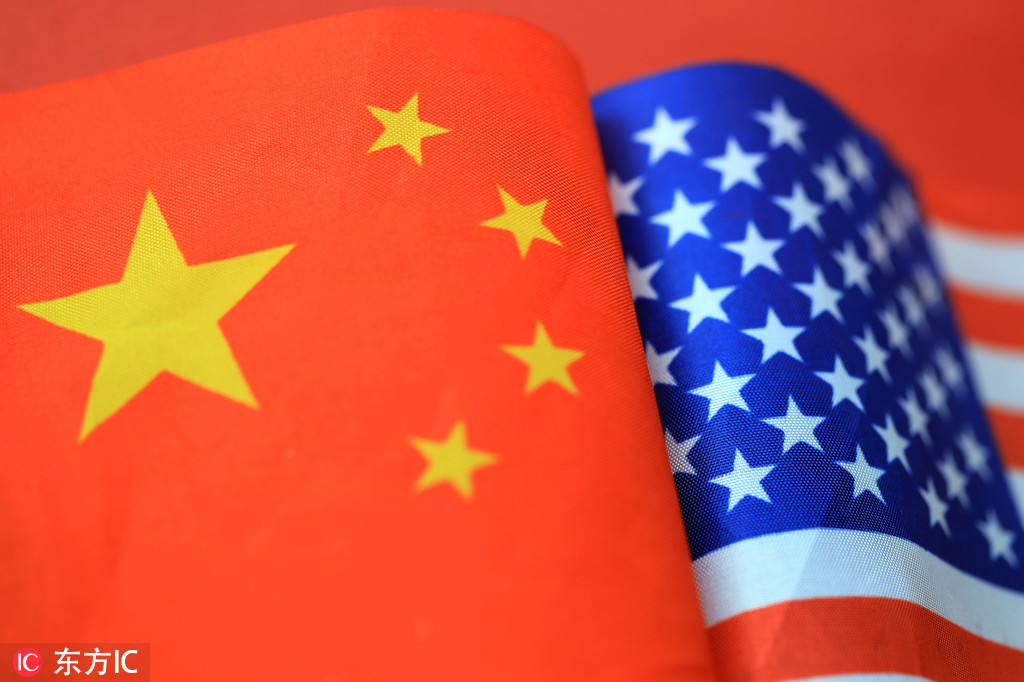US pundits call for resolution of trade dispute


US opinion writers are urging leaders of the US and China to resolve the trade dispute quickly, warning of major damage to both nations if tariffs remain in place.
Many editorials note American farmers have lost Chinese markets and argue that Donald Trump needs the votes of farmers to win reelection in 2020.
The US Chamber of Commerce estimates that 455,000 American jobs are put at risk by tariffs, and consumer prices are expected to rise in the US as a result of the tariffs on Chinese imports.
"China is not the enemy," Jeffrey Sachs, a professor at Columbia University, wrote in an opinion column published by CNN. "It is a nation trying to raise its living standards through education, international trade, infrastructure investment and improved technologies.
"In short, it is doing what any country should do. Yet the Trump administration is now aiming to stop China's development, which could prove to be disastrous for both the United States and the entire world," he wrote.
Sachs continued, "Trump is lashing out against China. (He) is willfully trying to crush successful companies like Huawei by changing the rules of international trade abruptly and unilaterally. China has been playing by Western rules for the past 40 years. Now, the United States is trying to pull the rug out from under China by launching a new Cold War."
The Wall Street Journal warned, "Prepare for some collateral economic damage as the two sides ratchet up their dueling tariffs" and noted, "This is a political trade risk the economy hasn't faced since the 1930s, and no one knows where it might end."
The Journal's editorial writers argued that reaching an agreement would benefit both nations and shouldn't be hard to hammer out:
"The outlines of a good deal seem clear enough. China makes specific commitments to reform its policies and markets to let foreign companies compete fairly without regulatory predation or theft. In return, Mr. Trump ought to agree to lift the tariffs he's imposed. This would give Mr. Xi a victory he can point to as he tries to sell China's trade concessions (at home). Mr. Trump can say the tariffs served their purpose, and he's achieved something with China no other president has."
The Washington Post criticized Trump for imposing tariffs on Canada and Mexico as part of trade negotiations and said: "This unforced error is doubly regrettable because Mr. Trump arguably had the upper hand going into his trade talks with China. The Chinese economy is more dependent on exports to the United States than vice-versa, and China's growth rate has been slowing while the US economy is creating jobs at a brisk pace.
"In a world where Mr. Trump is deeply unpopular his complaints — shared by previous US presidents—against China represented a rare case in which other nations conceded him the moral high ground. A savvier president would take advantage of that."
Earlier this month, the US repealed tariffs on steel and aluminum after reaching a new trade deal with Canada and Mexico.
Stephen Roach, a senior fellow at Yale University's Jackson Institute of Global Affairs and former chairman of Morgan Stanley Asia, wrote in Project Syndicate that the current trade dispute with China is similar to the 1980s trade dispute with Japan:
"'When governments permit counterfeiting or copying of American products, it is stealing our future, and it is no longer free trade.' So said US President Ronald Reagan, commenting on Japan in September 1985. Today resembles, in many respects, a remake of this 1980s movie, but with a reality-television star replacing a Hollywood film star in the presidential leading role — and with a new villain in place of Japan."
The New York Federal Reserve Bank estimated that US tariffs on China will cost American households about $831 a year.
At the Nomura Investment Forum Asia held recently in Singapore, Chief US Economist Lewis Alexander said the net effect of tariffs is likely to be negative for America, boosting inflation 0.5 percent in the next 12 months and slowing the economy.
There has been some speculation that the Federal Reserve will cut interest rates to stimulate the economy. But Alexander told CNBC such a move while inflation is ticking up could overheat the economy and lead to a painful downturn.
In Forbes magazine, columnist Jack Nasher argued: "Trump will be in serious trouble if tariffs on US products continue. The effect of the higher tariffs Trump announced would hit US economic growth by half a percentage point in 2020 and cost around 300,000 jobs. This could jeopardize Trump's 2020 reelection. Hence, tariffs are not a permanent option, but only a bargaining chip. (Investor) Warren Buffett is right when he says that a trade war would be bad, but 'There are times in negotiations when you talk tough. With some people in negotiations, the best technique is to act half crazy.'"
































